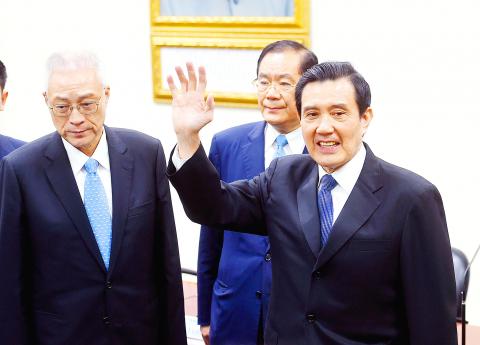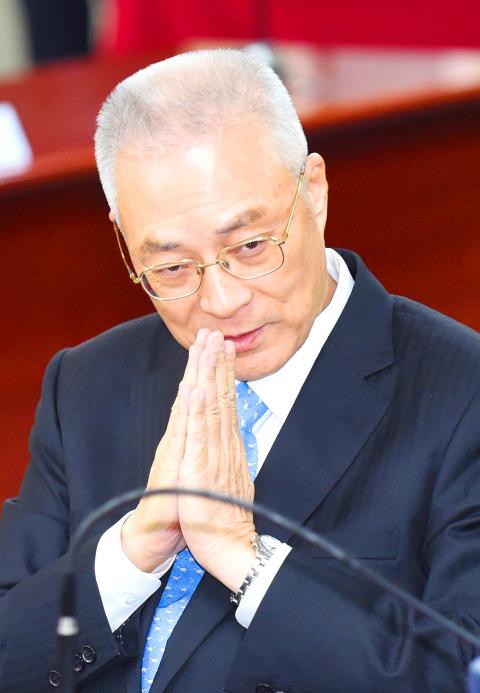President Ma Ying-jeou (馬英九) resigned as Chinese National Party (KMT) chairman yesterday at a meeting of the party’s Central Standing Committee, following the KMT’s unprecedented loss in the nine-in-one elections on Saturday.
Vice President Wu Den-yih (吳敦義), who is one of the KMT’s seven vice chairpeople, became the party’s acting chairman until one is elected.
After naming Wu acting chairman, the committee made vice chairperson Hung Hsiu-chu (洪秀柱), who is also legislative deputy speaker, secretary-general of the KMT.

Photo: Fang Pin-chao, Taipei Times
The KMT shakeup comes four days after voters dealt the ruling party a resounding defeat on Saturday, a fact Ma addressed in his resignation speech:
“First of all, I want to thank all the voters for their performance in these democratic elections. Every ballot represents the love that citizens have for Taiwan, and the poll results have reminded us that those in power must also be humble listeners,” he told the meeting.
“The KMT met unprecedented defeat in these elections. As party chairman, I have to apologize to all the supporters that I have disappointed,” he said. “To take responsibility for this, I am here to announce my resignation as KMT chairman.”

Photo: Liu Hsin-de, Taipei Times
Ma bowed deeply in apology for more than 10 seconds and said that the election results show that “our [the KMT’s] reforms have not occurred fast enough to meet the public’s expectations.”
Including yesterday’s meeting, Ma has now apologized three times for the party’s thrashing. Ma apologized for the KMT’s defeat on the day of the elections, but did not announce that he would be stepping down as chairman. Premier Jiang Yi-huah (江宜樺) and KMT Secretary-General Tseng Yung-chuan (曾永權), on the other hand, did announce their respective resignations on that day in response to the party’s showing.
However, the next day, it was reported that Ma would resign at the meeting that the committee holds every Wednesday.
At the party’s regular closed-door meeting on Tuesday, Ma apologized again and said that the public’s expectations have outpaced the KMT’s reforms, according to a press release.
He also said that while the party had lost this time, “we firmly believe that the country’s overall approach has not been a failure, nor has the direction liberalization reform has taken.”
Former KMT legislator Chang Sho-wen (張碩文), who was part of defeated KMT Taipei mayoral candidate Sean Lien’s (連勝文) campaign team, lashed out at Ma’s “reluctant resignation,” saying it was tendered “at the wrong time and with the wrong attitude.”
Chang said that Ma should have accompanied his announcement with an acknowledgement of his “false leadership,” but had instead insisted that the direction his reforms took was the correct one.
Chang also questioned why an outgoing chairman had the right to appoint the party’s acting chairman and secretary-general.
“Real reform would be to respect the institution [the party] and return power to the Central Standing Committee — the most powerful body within the party — instead of pulling strings behind the scenes,” Chang said, seeming to imply that the committee’s appointments for both roles had been made in accordance with Ma’s wishes.

CHAOS: Iranians took to the streets playing celebratory music after reports of Khamenei’s death on Saturday, while mourners also gathered in Tehran yesterday Iranian Supreme Leader Ayatollah Ali Khamenei was killed in a major attack on Iran launched by Israel and the US, throwing the future of the Islamic republic into doubt and raising the risk of regional instability. Iranian state television and the state-run IRNA news agency announced the 86-year-old’s death early yesterday. US President Donald Trump said it gave Iranians their “greatest chance” to “take back” their country. The announcements came after a joint US and Israeli aerial bombardment that targeted Iranian military and governmental sites. Trump said the “heavy and pinpoint bombing” would continue through the week or as long

TRUST: The KMT said it respected the US’ timing and considerations, and hoped it would continue to honor its commitments to helping Taiwan bolster its defenses and deterrence US President Donald Trump is delaying a multibillion-dollar arms sale to Taiwan to ensure his visit to Beijing is successful, a New York Times report said. The weapons sales package has stalled in the US Department of State, the report said, citing US officials it did not identify. The White House has told agencies not to push forward ahead of Trump’s meeting with Chinese President Xi Jinping (習近平), it said. The two last month held a phone call to discuss trade and geopolitical flashpoints ahead of the summit. Xi raised the Taiwan issue and urged the US to handle arms sales to

BIG SPENDERS: Foreign investors bought the most Taiwan equities since 2005, signaling confidence that an AI boom would continue to benefit chipmakers Taiwan Semiconductor Manufacturing Co’s (TSMC, 台積電) market capitalization swelled to US$2 trillion for the first time following a 4.25 percent rally in its American depositary receipts (ADR) overnight, putting the world’s biggest contract chipmaker sixth on the list of the world’s biggest companies by market capitalization, just behind Amazon.com Inc. The site CompaniesMarketcap.com ranked TSMC ahead of Saudi Aramco and Meta Platforms Inc. The Taiwanese company’s ADRs on Tuesday surged to US$385.75 on the New York Stock Exchange, as strong demand for artificial intelligence (AI) applications led to chip supply constraints and boost revenue growth to record-breaking levels. Each TSMC ADR represents

State-run CPC Corp, Taiwan (CPC, 台灣中油) yesterday said that it had confirmed on Saturday night with its liquefied natural gas (LNG) and crude oil suppliers that shipments are proceeding as scheduled and that domestic supplies remain unaffected. The CPC yesterday announced the gasoline and diesel prices will rise by NT$0.2 and NT$0.4 per liter, respectively, starting Monday, citing Middle East tensions and blizzards in the eastern United States. CPC also iterated it has been reducing the proportion of crude oil imports from the Middle East and diversifying its supply sources in the past few years in response to geopolitical risks, expanding